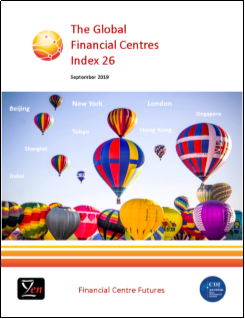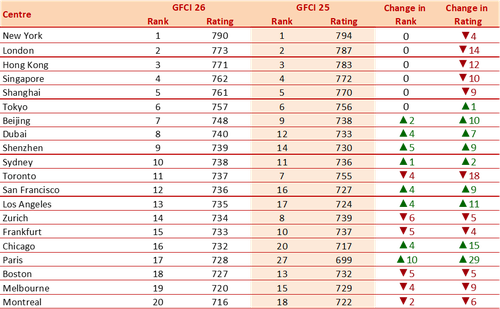Can AI eliminate the threat of cyberfraud completely? The Future of Fintech special report covers the shift from not only detecting cyberfraud, but possibly eliminating it. It also explores how mobile apps are enabling consumers to become better investors and bank runs in a cashless society. It examines five common financial challenges immigrants face when arriving in a new country and how startups are offering services to make migrant transition financially more accessible.
29 September 2019
23 September 2019
Raconteur: Future of Payments 2019
96 per cent of people in Singapore are ready and willing to use biometric payments, according to a recent study by Visa, but is this enthusiasm mirrored elsewhere? The Future of Payments special report, published in The Times, examines the barriers to widespread biometric adoption, the arguments for and against facial recognition, and why Scandinavian banks have decided to embrace wearables over fingerprints. It covers the obstacles in the way of India’s transition to mobile money only and whether going cashless will mean financial exclusion for the elderly. Other issues explored include why America is so behind in payment technology, if Apple’s new credit card is a cause for concern and whether money really can buy happiness, after all.
21 September 2019
Mauritius: FSC issues Investor Alert on “Cloud Token Mauritius” & “Cloud Token Indian Ocean and Africa”
It has come to the attention of the Financial Services Commission (the “FSC”) that the public is being solicited by a certain group of people on social media under the name of “Cloud Token Mauritius” and “Cloud Token Indian Ocean and Africa” to invest in digital assets and crypto currencies through the “Cloud Token” mobile application. It has also come to the attention of the FSC that events are being hosted in publicly accessible areas in Mauritius to promote this application.
The public is informed that Cloud Token Mauritius and Cloud Token Indian Ocean and Africa and/or any other individuals or representatives operating under these names are not and have not, at any point in time, been licensed and regulated by the FSC.
19 September 2019
Globalization in Asia: Flows and networks shaping the Asian Century | McKinsey
The Asian Century has begun. Asia is the world’s largest regional economy and, as its economies integrate further, it has the potential to fuel and shape the next phase of globalization.
Trulioo: Beneficial ownership rules: improving transparency and availability of UBO information
To help put an end to financial crime and corruption, one of the most important steps regulators and governments can take is to ensure that effective beneficial ownership transparency rules and procedures are in place.
18 September 2019
Z/Yen: Global Financial Centres Index 26 (GFCI 26)
London hung onto its second place ranking in the Global Financial Centres Index 26, launched today by Z/Yen Group in partnership with the China Development Institute (CDI) in both London and Shenzhen.
New York extended its lead over London to 17 points. Strong performances from other centres, in particular Paris, put London’s second place in the index at risk next time. If London and Paris have similar falls and rises in the ratings for GFCI 27, London would be reduced to a two point lead over Paris and lie behind Shanghai.
The new FinTech index, published for the first time alongside the GFCI, is dominated by Chinese centres taking five of the top seven places in the index, led by Beijing and Shanghai. New York, London, Singapore, San Francisco, and Chicago also feature in the top ten for FinTech.
Trade wars, geopolitical unrest, and Brexit are introducing significant adjustments to medium-term perceptions.
The top 20 centres are shown in the table below.
Other News
Twelve centres rose 10 or more places in the rankings and ten fell 10 or more places.
Performance across the index showed slightly reduced confidence, with the overall ratings falling around 2.5% from GFCI 25. Thirty-one of the 104 centres fell in the ratings, including all of the top five centres.
Seven of the top ten places in the index are now taken by Asia/Pacific centres, continuing the region’s strong performance over recent years.
Leading Centres
New York retains its first place in the index, extending its lead over London from seven to 17 points. Hong Kong is now only two points behind London. Singapore and Shanghai remain in fourth and fifth position. All five top centres fell in the ratings in GFCI 26.
London held onto second place in the index, but fell 14 points in the ratings. If London and Paris have similar falls and rises in the ratings in GFCI 27, London would be reduced to a two point lead over Paris and would lie behind Shanghai.
Shenzhen, Dubai, and Sydney entered the top 10, easing out Toronto, Zurich, and Frankfurt.
Within the top 30 centres, Paris has performed well, rising 10 places to 17th.
Western Europe
Following a good performance in GFCI 25, this region had a more mixed performance in GFCI 26, with 15 centres rising in the rankings and 13 falling.
Asia/Pacific
Asia/Pacific Centres performed well, with 20 of the 27 centres in the region either retaining or improving their position in the rankings. Nanjing entered the index for the first time.
There were significant rises for Wellington, Mumbai, and Chengdu.
North America
North American centres had mixed fortunes in GFCI 26, with Canadian centres dropping back following their improved performance in GFCI 25, while US centres generally improved their rankings and ratings.
Seven out of the ten North American centres in the index are in the top 20.
Eastern Europe & Central Asia
Nur-Sultan (formerly Astana) retained its top ranking in the Eastern Europe & Central Asia region, consolidating its position despite being a recently-formed financial centre.
All but two of the 16 centres in the region improved their rating, with nine centres improving their overall ranking.
Middle East & Africa
Dubai, Casablanca, Tel Aviv, and Doha continued to rise in the index, with Dubai entering the top ten in the world. There were significant improvements for Mauritius, Bahrain, and Nairobi.
Latin America & The Caribbean
The Bahamas and Buenos Aries performed well in GFCI 26, rising 11 and ten places in the rankings respectively.
Island Centres
The British Crown Dependencies’ performance dipped, with the Isle of Man down five places in the rankings, Jersey falling 12, and Guernsey continuing its rapid decline in the index, dropping 17 places following its 15-place fall in GFCI 25.
Full details of GFCI 26 can be found at www.globalfinancialcentres.net
Professor Michael Mainelli, Executive Chairman of Z/Yen, said:
"Competition at the top of the GFCI is intensifying. London is in a ‘slipping second’ position globally and a ‘slipping first’ in Europe amidst high volatility emanating from policy uncertainties, Brexit, trade wars, and geopolitical unrest. Asian centres and a resurging Paris are fighting for that second place spot.”
New York extended its lead over London to 17 points. Strong performances from other centres, in particular Paris, put London’s second place in the index at risk next time. If London and Paris have similar falls and rises in the ratings for GFCI 27, London would be reduced to a two point lead over Paris and lie behind Shanghai.
The new FinTech index, published for the first time alongside the GFCI, is dominated by Chinese centres taking five of the top seven places in the index, led by Beijing and Shanghai. New York, London, Singapore, San Francisco, and Chicago also feature in the top ten for FinTech.
Trade wars, geopolitical unrest, and Brexit are introducing significant adjustments to medium-term perceptions.
The top 20 centres are shown in the table below.
Other News
Twelve centres rose 10 or more places in the rankings and ten fell 10 or more places.
Performance across the index showed slightly reduced confidence, with the overall ratings falling around 2.5% from GFCI 25. Thirty-one of the 104 centres fell in the ratings, including all of the top five centres.
Seven of the top ten places in the index are now taken by Asia/Pacific centres, continuing the region’s strong performance over recent years.
Leading Centres
New York retains its first place in the index, extending its lead over London from seven to 17 points. Hong Kong is now only two points behind London. Singapore and Shanghai remain in fourth and fifth position. All five top centres fell in the ratings in GFCI 26.
London held onto second place in the index, but fell 14 points in the ratings. If London and Paris have similar falls and rises in the ratings in GFCI 27, London would be reduced to a two point lead over Paris and would lie behind Shanghai.
Shenzhen, Dubai, and Sydney entered the top 10, easing out Toronto, Zurich, and Frankfurt.
Within the top 30 centres, Paris has performed well, rising 10 places to 17th.
Western Europe
Following a good performance in GFCI 25, this region had a more mixed performance in GFCI 26, with 15 centres rising in the rankings and 13 falling.
Asia/Pacific
Asia/Pacific Centres performed well, with 20 of the 27 centres in the region either retaining or improving their position in the rankings. Nanjing entered the index for the first time.
There were significant rises for Wellington, Mumbai, and Chengdu.
North America
North American centres had mixed fortunes in GFCI 26, with Canadian centres dropping back following their improved performance in GFCI 25, while US centres generally improved their rankings and ratings.
Seven out of the ten North American centres in the index are in the top 20.
Eastern Europe & Central Asia
Nur-Sultan (formerly Astana) retained its top ranking in the Eastern Europe & Central Asia region, consolidating its position despite being a recently-formed financial centre.
All but two of the 16 centres in the region improved their rating, with nine centres improving their overall ranking.
Middle East & Africa
Dubai, Casablanca, Tel Aviv, and Doha continued to rise in the index, with Dubai entering the top ten in the world. There were significant improvements for Mauritius, Bahrain, and Nairobi.
Latin America & The Caribbean
The Bahamas and Buenos Aries performed well in GFCI 26, rising 11 and ten places in the rankings respectively.
Island Centres
The British Crown Dependencies’ performance dipped, with the Isle of Man down five places in the rankings, Jersey falling 12, and Guernsey continuing its rapid decline in the index, dropping 17 places following its 15-place fall in GFCI 25.
Full details of GFCI 26 can be found at www.globalfinancialcentres.net
Professor Michael Mainelli, Executive Chairman of Z/Yen, said:
"Competition at the top of the GFCI is intensifying. London is in a ‘slipping second’ position globally and a ‘slipping first’ in Europe amidst high volatility emanating from policy uncertainties, Brexit, trade wars, and geopolitical unrest. Asian centres and a resurging Paris are fighting for that second place spot.”
10 September 2019
06 September 2019
Back to Basics: What Is Stress Testing?
Checking the health of banks is crucial to financial stability. In this explainer, the IMF talks about stress testing.
Hidden Corners of the Global Economy: More Sand Than Oil
Sub-Saharan Africa stands to gain more from reducing corruption than any other region, says the IMF’s Nelson Sobrinho and Vimal Thakoor.
Hidden Corners of the Global Economy: Privacy vs Transparency
Transparency is a potent weapon in the battle against illicit financial flows, corruption and tax evasion says the IMF’s Jay Purcell and Ivana Rossi.
Hidden Corners of the Global Economy: The Truth about the Dark Web
Aditi Kumar and Eric Rosenbach of Harvard’s Belfer Center discuss the origins and evolution of the dark web, where an underground marketplace for illicit activity has emerged.
Hidden Corners of the Global Economy: The Cost Of Corruption
Global corruption distorts the activities of the state and ultimately takes a toll on economic growth and the quality of people’s lives, says the IMF’s Paul Mauro, Paulo Medas and Jean-Marc Fournier.
Hidden Corners of the Global Economy: Nonprofits Investigate Profits
ICIJ’s Charles Lewis discusses the role and future of nonprofit journalism in fighting corruption worldwide.
Hidden Corners of the Global Economy: Who Owns the Wealth in Tax Havens?
Accounting for offshore assets substantially boosts the wealth share of the very richest people. In short, inequality may be far greater than other studies have found.
Hidden Corners of the Global Economy: The Art of Money Laundering
Tom Mashberg digs deeper into the loosely regulated art market—ideal ground for money laundering—and how best address this challenge.
Hidden Corners of the Global Economy: Shining a Light
Acting IMF Managing Director David Lipton discusses the dark side of the global economy and why bringing money out of the shadows means improving governance.
Hidden Corners of the Global Economy: The Rise of Phantom Investments
Empty corporate shells in tax havens undermine tax collection in advanced, emerging market, and developing economies.
Hidden Corners of the Global Economy: Tackling Tax Havens
Nicholas Shaxson explains why the many billions attracted by tax havens do harm to sending and receiving nations alike, and how best to tackle this global economic challenge.
04 September 2019
Nespresso brings back its popular Italian limited edition coffees
Nespresso is bringing back two of its most popular Limited Edition coffees: Tribute to Milano and Tribute to Trieste. These two coffees, inspired by two iconic Italian cities, will delight coffee lovers with their unique taste profiles. Initially launched in 2013 and 2015, these two blends are still some of the most loved Nespresso Limited Edition coffees and are now back by popular demand.
Nespresso limited edition Tribute to Trieste
The Nespresso Tribute to Trieste Limited Edition coffee is a reflection of the rich and varied cultural experience that the city of Trieste offers. Sitting at the crossroads of Italian, Germanic and Slavic cultures, Trieste was the main entrance to one of the world’s premier historical powers, the Austro-Hungarian Empire. All green coffee bound for the coffee houses of Vienna came into Trieste.
In fact, the way in which Trieste inhabitants take their coffee is representative of this many-faceted port. Coffee in Trieste can be taken with milk, without milk, long or short. If there was one sign that really demonstrated the special place coffee has in this city, the inhabitants of Trieste have even created their own specific language around their coffee – “nero” is an espresso, “capo” is with a dash of milk and coffee served in a glass rather than the usual china cup is “in b”. The Nespresso interpretation of Trieste is a delicate Arabica blend primarily using South American beans is characterised by a round texture with chocolate and fresh hazelnut notes. A refreshing fruity touch enhances this fine coffee.
Nespresso limited edition Tribute to Milano
Milan has played a significant role in shaping Italy’s coffee history and first introduced the espresso at the World Fair in 1906. Today the espresso is so iconic and is such an important part of daily life that the word is no longer used– it is simply “un caffè”.
The Nespresso Tribute to Milano Limited Edition coffee is an interpretation of the hustle and bustle of the vibrant city of Milan, where coffee is often enjoyed at a fast pace whilst standing at the bar. It is a highly aromatic blend of Arabica coffees from Central and South America strengthened with an unwashed Indian Robusta. The elegant result gives a delightful balance between fine fruity aromas and sweet cereal notes.
Subscribe to:
Posts (Atom)





















